The Hobbit and The Lord of the Rings take place in a world called Middle Earth. And while there’s a lot of interesting stuff in the books and films, as a registered dietitian, I’m, of course, most interested in the food.
Hobbits love to eat, but their diet isn’t exactly a model of health. In The Hobbit, when an uninvited party arrives at Bilbo Baggins’ door, the guests demand the following from their host: pastries, cheese, meat pies, cakes, alcohol, eggs, and cold cuts.
I bring this up because the word “Mediterranean” literally comes from the Latin for “Middle of the Earth.” But unlike J.R.R. Tolkien’s Middle Earth, Mediterranean cuisine in our world is largely plant-based and extremely healthy.
In fact, health experts consider it one of the healthiest eating patterns on the planet. And there’s growing interest in the Mediterranean diet for its ability to prevent and manage a number of chronic diseases.
So, in this article, we’ll explore the Mediterranean diet, delve into key plant-based ingredients, and provide practical tips for cooking and enjoying vibrant, vegan Mediterranean recipes in your kitchen.
What Is the Mediterranean Diet?
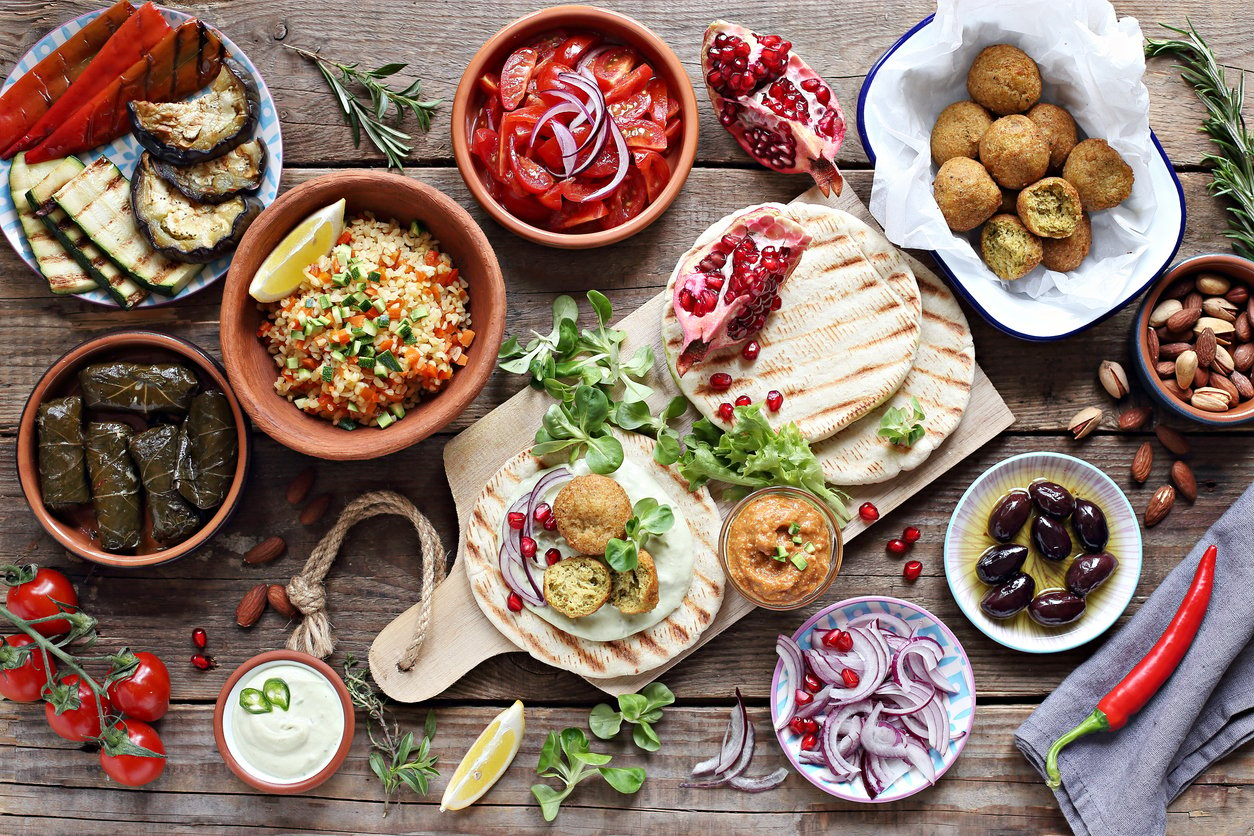
There’s no single way to define what the Mediterranean diet is. Instead, it’s helpful to think of it in more general terms, as a way of eating inspired by the traditional dietary patterns of states, countries, and regions bordering the Mediterranean Sea, such as:
- Italy
- Greece
- Spain
- Turkey
- The South of France
- Malta
- Croatia
- Albania
- Turkey
- Cyprus
- Israel
- Lebanon
- Syria
- Palestine
- Morocco
- Algeria
- Tunisia
- Libya
- Egypt
Now that’s a food court that I wouldn’t mind visiting!
To testify to the health-promoting benefits of the diet, two of the world’s five “blue zones” (areas with the greatest life expectancies and the highest percentage of centenarians) can be found in the Mediterranean: Icaria, Greece, and Nuoro Province, Sardinia, Italy.
While some popular interpretations of Mediterranean eating emphasize foods like olive oil, red wine, and fish, at its core, the Mediterranean diet emphasizes whole, minimally processed plant-based foods. In this respect, it’s similar to other plant-based diets, including their health benefits.
It’s not just the food, though, responsible for the remarkable vigor and long lives of so many people eating this way. The blue zones are also characterized by lots of outdoor physical activity, emphasis on community and family, and time to unwind. That’s why proponents of the diet also encourage people to upgrade their lifestyles to include more social time, movement, and time in nature.
Why Is the Mediterranean Diet So Highly Regarded?
I repeat: the Mediterranean diet is a predominantly plant-based way of eating. This alone can explain its power to keep you healthy and even slow or reverse some diseases. And because it’s not necessarily a 100% plant-based or vegan diet, it’s become more mainstream.
For example, the magazine U.S. News & World Report has consistently ranked the Mediterranean diet as one of the best diets overall for healthfulness, weight loss, and long-term adaptability.
Part of its appeal stems from the rich traditions that inspire it. UNESCO has added it to the Representative List of the Intangible Cultural Heritage of Humanity.
And that’s not just marketing hype. There are also quite a few studies that support its health benefits. A 2019 literature review identified the Mediterranean diet as a powerfully heart-healthy way of eating. And a 2021 meta-analysis found that the diet was associated with a lower risk of several common and deadly cancers, including breast, colorectal, head and neck, respiratory, gastric, bladder, and liver cancers.
A huge study published in 2024 also monitored dietary choices and health outcomes for over 25,000 women for an average of 25 years. The researchers found that women who followed a Mediterranean diet had a one-fifth lower risk of dying than women who ate a standard industrialized diet higher in processed and animal-based foods.
Many benefits of this way of eating have been attributed to adherents’ greater intake of vegetables, legumes, and nuts.
Key Ingredients for Plant-Based Mediterranean Recipes
The only diet healthier than a Mediterranean diet might be a whole-food, plant-based Mediterranean diet. Let’s look at some of the main ingredients of such a diet.
Whole Grains
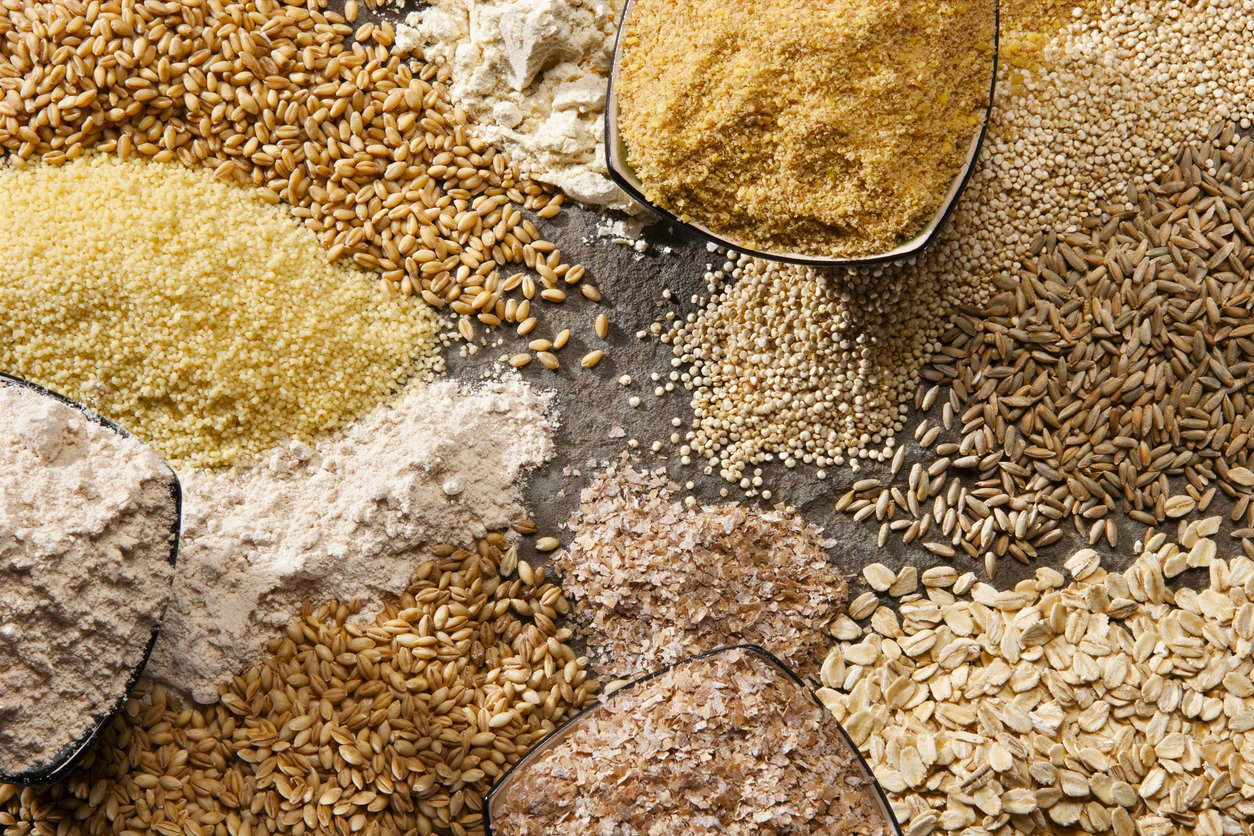
Whole grains, such as oats, rice, barley, quinoa, and others, are associated with a host of positive health outcomes.
The headline of a very long 2021 scientific review article trumpets their benefits: “Whole-Grain Intake in the Mediterranean Diet… Can Help to Reduce Mortality from Cardiovascular Disease, Slow Down the Progression of Aging, and to Improve Lifespan.”
For more information on whole grains, check out our full article, Cooking With Whole Grains: How to Soak, Cook, & Store Grains.
Fruit
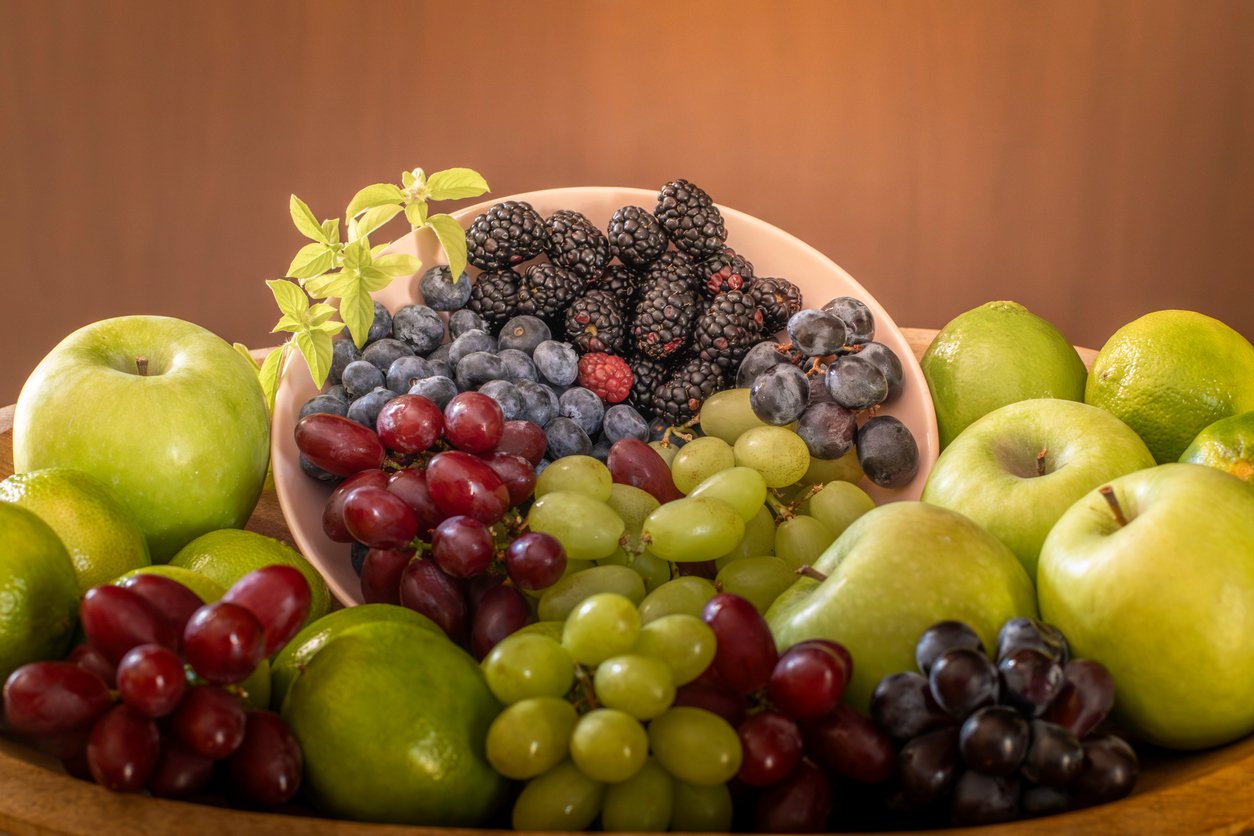
The Mediterranean climates and soils are very fruit-friendly, so you’ll find people eating lots of avocados, citrus, berries, grapes, dates, and orange-colored fruits like peaches, apricots, nectarines, and cantaloupes.
Studies have shown that eating fruit can reduce the risk of dying from any cause, as well as lower the chances of experiencing coronary heart disease, stroke, type 2 diabetes, high blood pressure, colorectal cancer, and obesity.
Vegetables
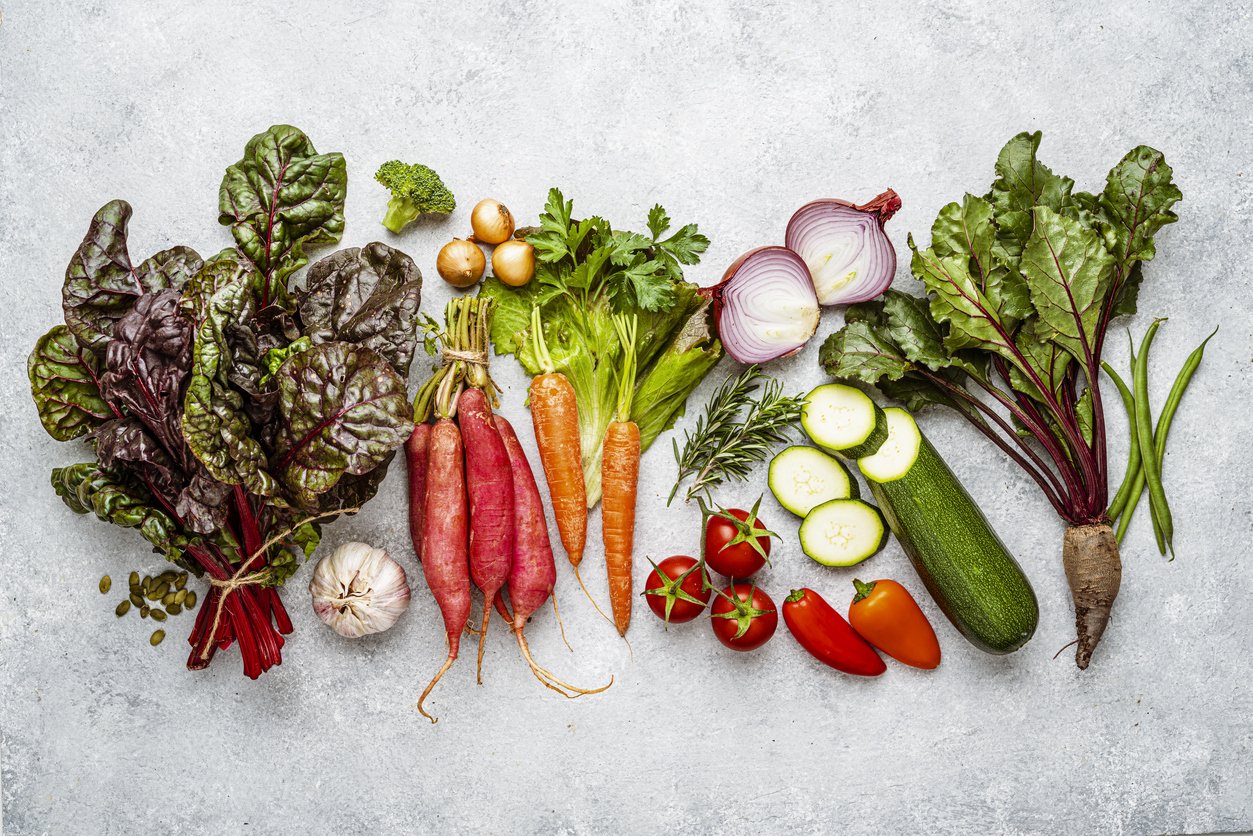
Veggies are the heart of most healthy plant-based diets, and the Mediterranean diet is no exception. Followers regularly eat leafy greens, tomatoes, eggplant, radishes, onions, garlic, cucumber, and many other vegetables.
Studies have shown that eating lots of fruits and vegetables is one of the best ways to protect yourself from premature death.
Legumes
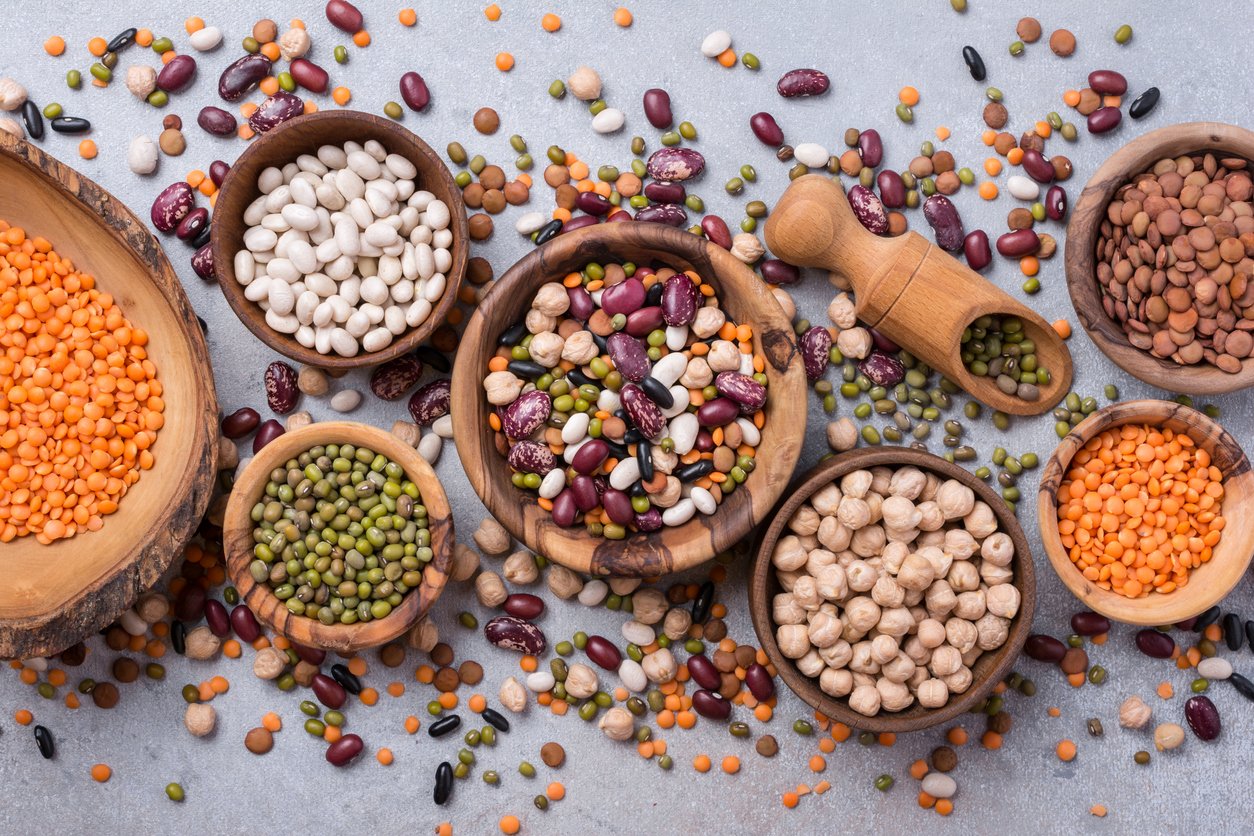
One of the most striking features of every blue zone diet is the centrality of beans and other legumes. The Mediterranean diet features kidney beans, white beans, black beans, chickpeas, lentils, peas, and many other pulses.
Like vegetables, legumes are another food group associated with a lower risk of death.
Pulses and beans are packed with flavanols, a polyphenol that can help improve blood vessel function, reduce cholesterol and blood pressure, and keep your energy levels in check.
Here’s our full article on beans, including their health benefits and some ways to include them in your cooking.
Herbs and Spices
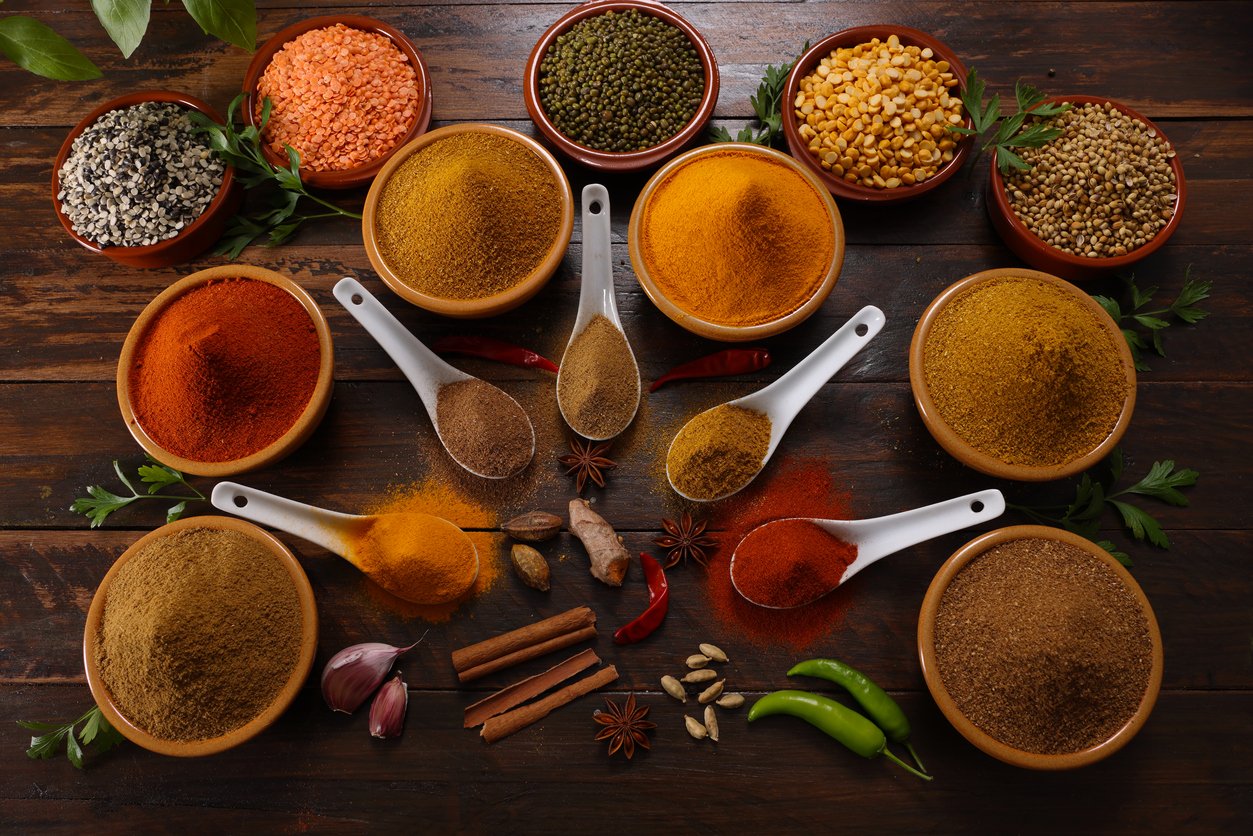
The Mediterranean diet gets much of its flavor — and a good deal of its health benefits — from its liberal use of signature herbs and spices. Here’s a place where we really have to talk about Mediterranean diets in the plural.
Italian food tends to use leafy herbs such as basil, oregano, parsley, sage, marjoram, and bay leaves for flavor; Greek dishes include more dill, mint, and fennel; Spanish cuisine gets accented by saffron and paprika; and North African food often features spicier chilis, cumin, cardamom, coriander, caraway seeds, and cinnamon.
Learn more about how to use herbs and spices for taste and health.
Nuts
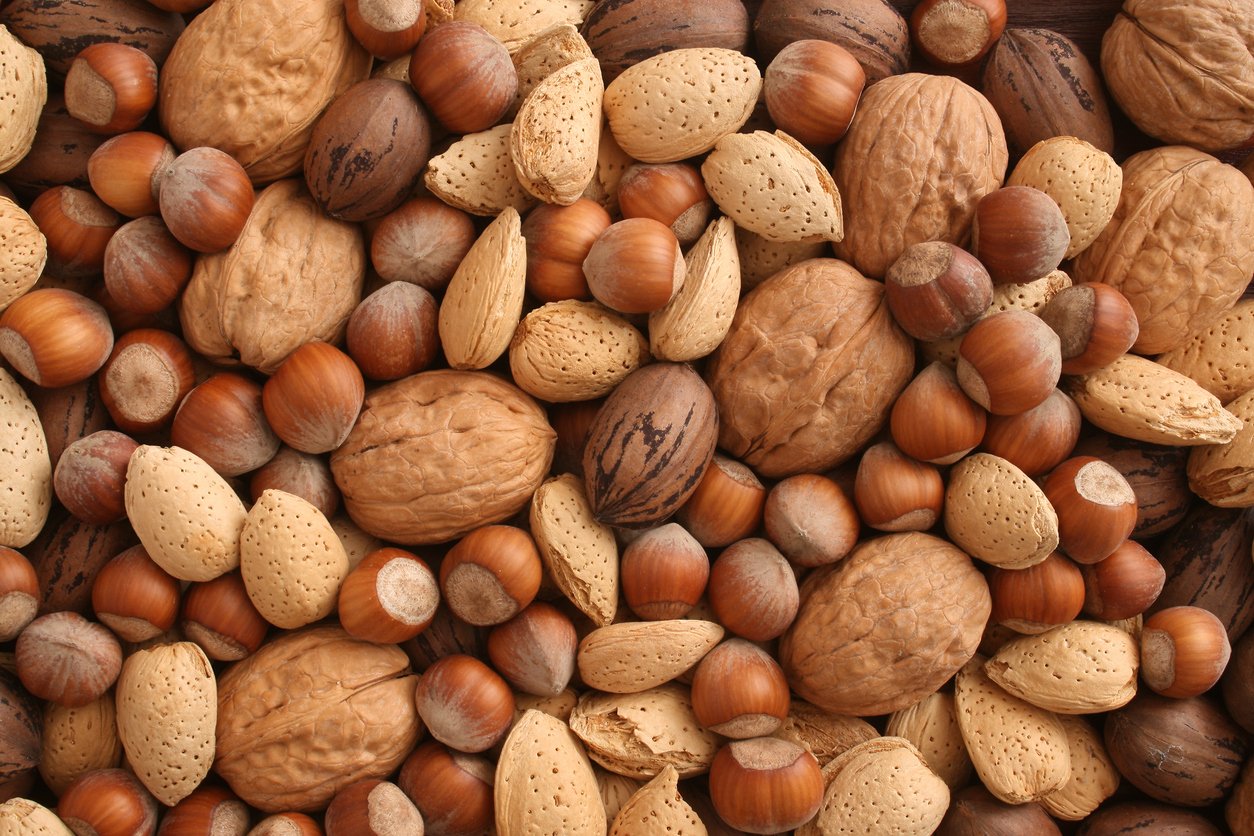
Nuts are another key element in most healthy Mediterranean diets. Many dishes include almonds, hazelnuts, Brazil nuts, walnuts, pistachios, and others.
Not only are nuts delicious sources of healthy fats but they have also been shown to improve several metabolic biomarkers related to heart health and blood sugar regulation.
Want to go nuts about nuts? Our comprehensive article on the health benefits of walnuts, one of the best-studied nuts, is a good place to start.
Olive Oil
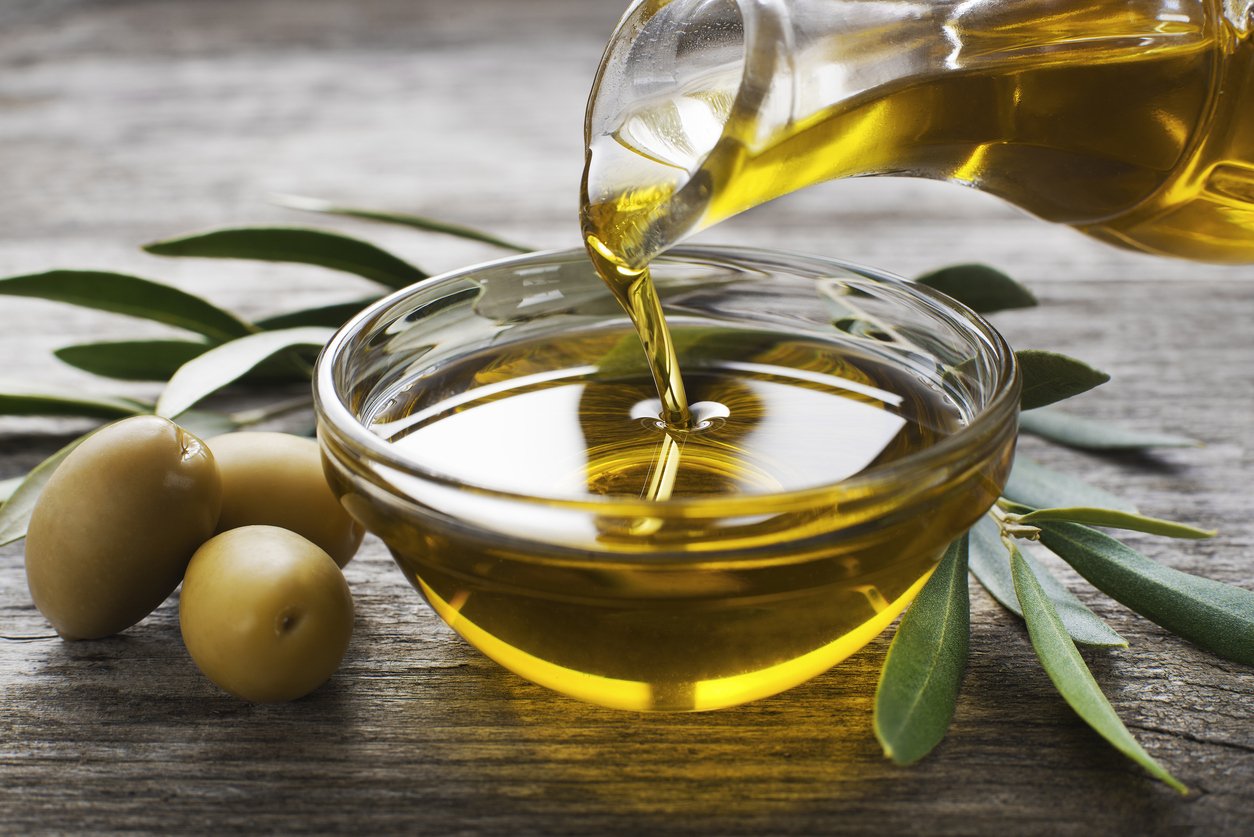
One way Mediterranean diets differ from strictly whole-food, plant-based diets is in their use of refined plant oils, especially extra virgin olive oil.
Studies have shown that olive oil can confer some health benefits, such as cardiovascular disease prevention and protection against obesity, type 2 diabetes, and some types of cancer.
It depends on context, however. Replacing less healthy fats with olives or olive oil could be beneficial.
But, due to the extremely high caloric density of refined oils, olive oil could be problematic if you’re trying to lose weight or are already dealing with cardiovascular disease. In those cases, a lower-fat diet may be advisable.
Animal Products (and Their Analogues)
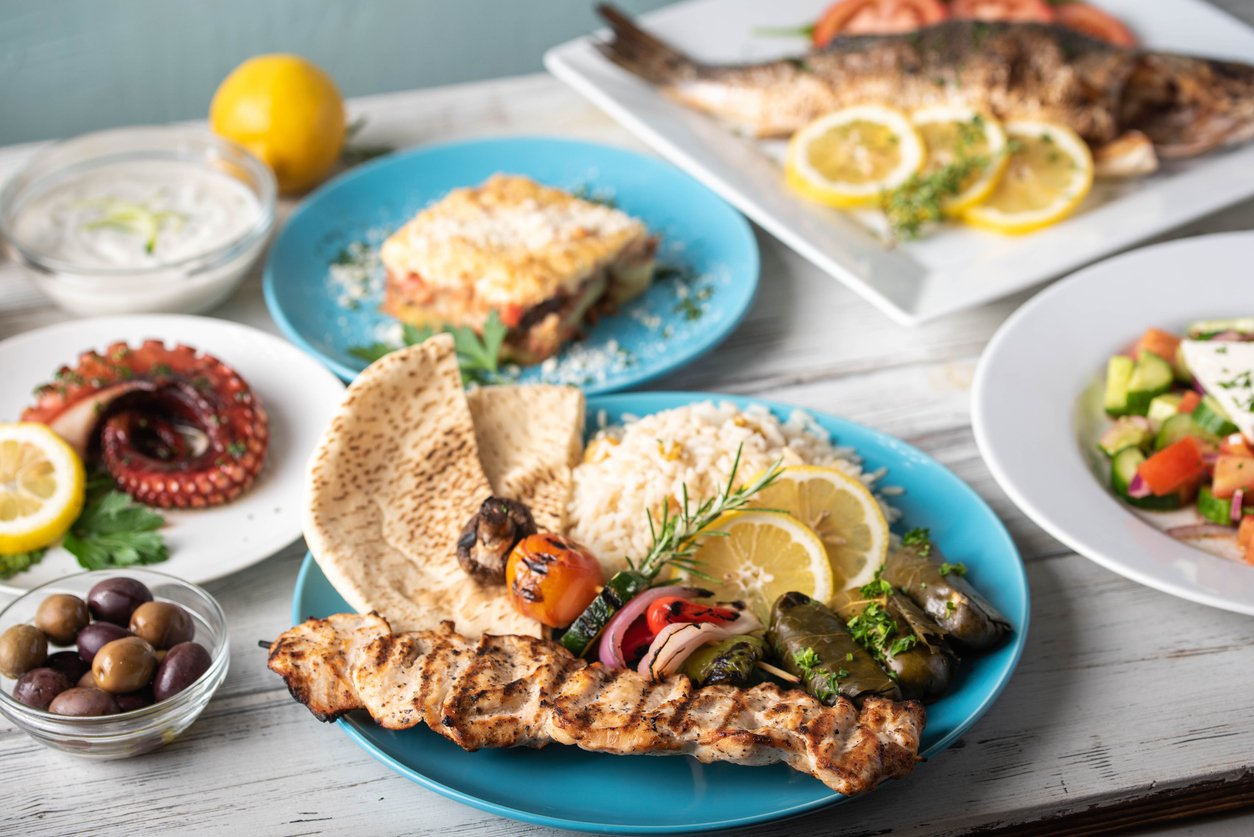
Traditional Mediterranean diets may also include animal products such as dairy, seafood, and some lean meats, but in far fewer amounts than the standard industrialized diet. When meat is included, it’s often used as a side dish or flavoring to a main dish of whole grains and vegetables, or in equal amounts.
You can enjoy a fully vegan Mediterranean diet without including animal products or by using plant-based analogues as transition foods, making it even healthier for you and more sustainable for the planet.
Tips for Cooking and Enjoying Healthy Mediterranean Recipes
So, now that we’re clear on the ingredients, let’s talk about how to cook Mediterranean food in your kitchen.
You need high-quality ingredients to start. Look for fresh fruits and vegetables that are in season to maximize flavor and nutritional value.
Eat the rainbow, incorporating a variety of colors and types to ensure a broad spectrum of nutrients.
You’ll also want to prioritize whole foods over processed ones. Start with whole grains such as quinoa, farro, and bulgur as a base for your dishes, as they provide lots of fiber and essential nutrients. Then, include the ingredients mentioned in the previous section to round out the nutritional potential of your meals.
Instead of relying on salt, oil, and sugar, use herbs and spices to add depth and complexity to your dishes.
Creating flavorful dressings and sauces using ingredients like lemon juice, vinegar, tahini, and fresh herbs can add more zing and flavor.
To minimize your consumption of bottled oils, use water or broth for stovetop cooking. Also, you can replace unhealthy saturated fats with healthier unsaturated ones.
Last but definitely not least, remember that the Mediterranean diet is a way of living, not just eating. The social aspects of life in the Blue Zones may add as many years of healthy life as the food itself.
So whenever possible, take time to enjoy meals with loved ones. This can make eating more enjoyable and promote a balanced, healthy relationship with food.
Vegan Mediterranean Recipes
Grab your passport and explore Mediterranean cuisine’s vibrant, colorful, and flavorful essence with these seven plant-based recipes!
Each dish captures the diverse ingredients and bold flavors that make Mediterranean food a favorite around the world.
From creamy breakfast toast and refreshing salads to hearty mains and indulgent desserts, these recipes bring the best of the Mediterranean to your kitchen and are completely plant-based.
Savor the sunny flavors of olives, fresh herbs, juicy tomatoes, and more, all in delicious dishes that are as wholesome as they are satisfying!
1. Mediterranean Breakfast Toast
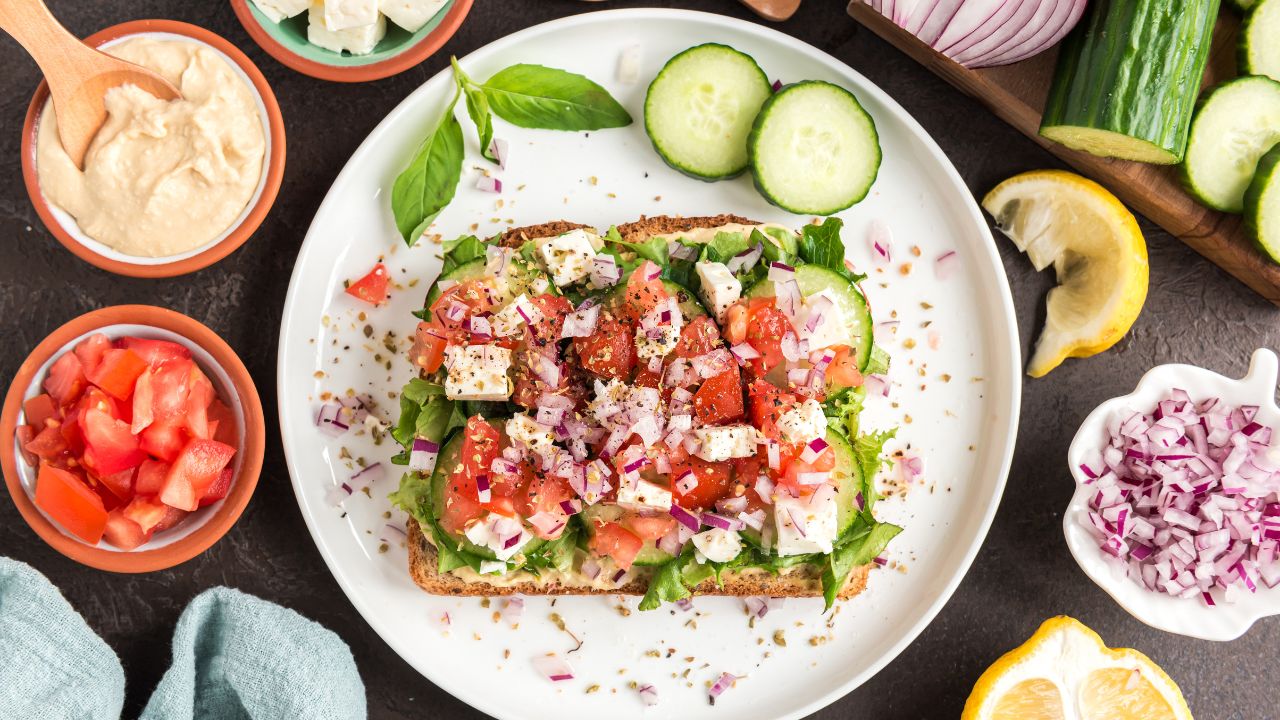
This Mediterranean Breakfast Toast combines all your favorite Mediterranean flavors in a hummus toast that stands out from the rest! Creamy hummus, crunchy veggies, and tangy vegan feta add a unique touch. Perfect for a light breakfast or lunch, it’s a deliciously healthy way to start your day!
2. Greek Quinoa Salad
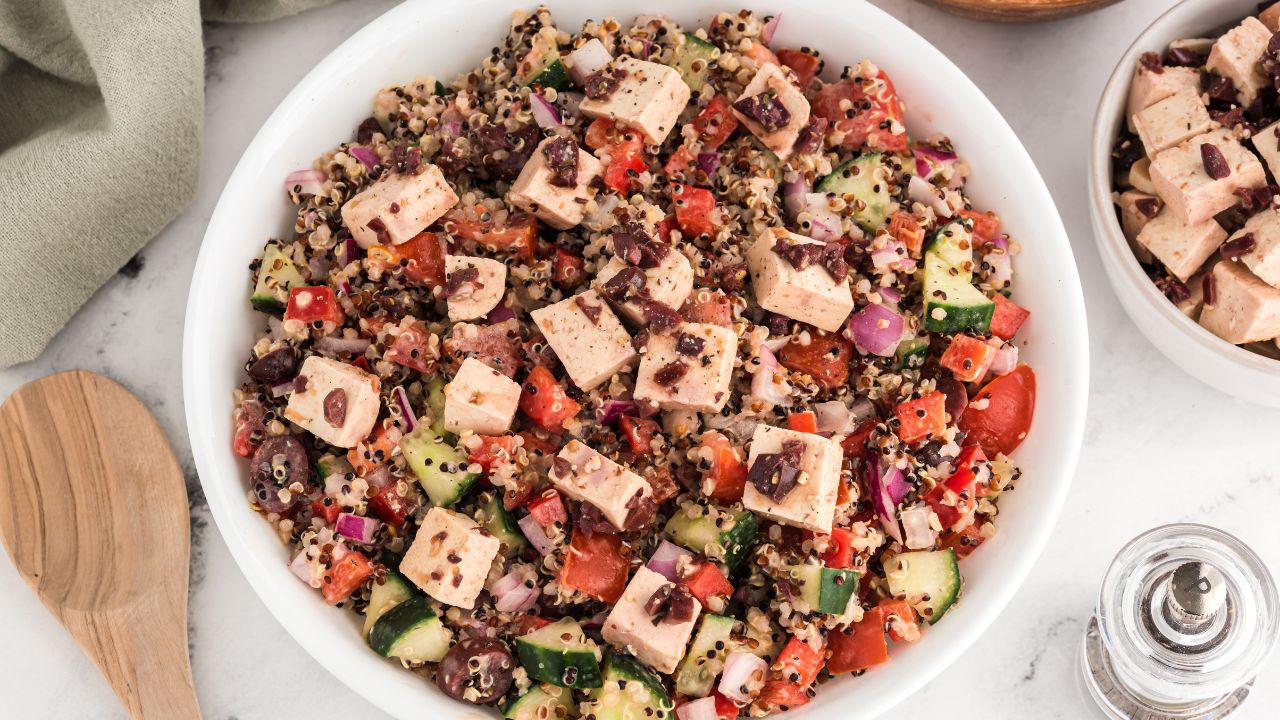
Enjoy the fresh, vibrant flavors of the Mediterranean with this Greek Quinoa Salad! Filled with organic quinoa, juicy tomatoes, crisp cucumbers, red bell pepper, and tangy Kalamata olives, this salad is both refreshing and satisfying. The zesty tahini dressing, with red wine vinegar, lemon juice, and a touch of maple syrup, is the perfect blend of flavors. Finished with fresh parsley and oregano, this salad is a tasty and wholesome way to savor a Greek recipe.
3. Ash Reshteh (Persian Noodle Soup With Rice and Beans)
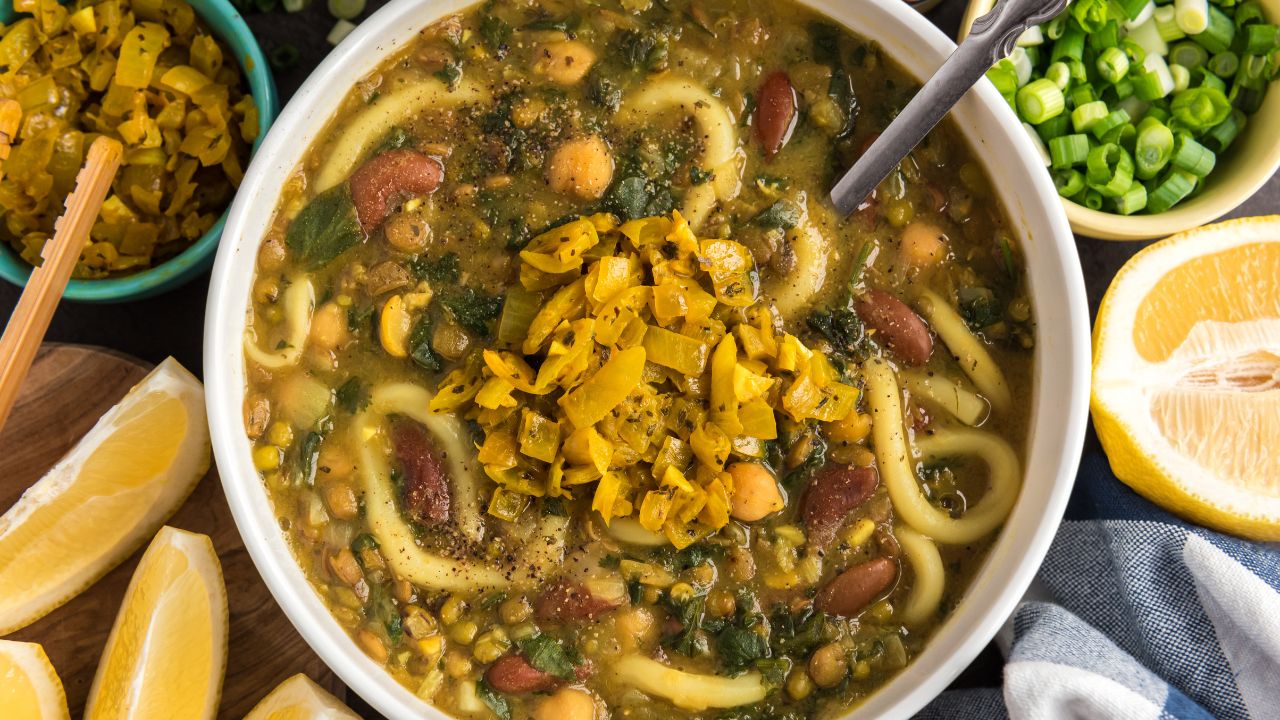
Ash Reshteh is a beloved Persian noodle soup from Iran, rich with beans, herbs, and noodles central to Mediterranean and Middle Eastern cuisine. Traditionally enjoyed during Persian New Year and festive occasions, this hearty soup features reshteh noodles and a blend of greens and legumes like spinach, lentils, and chickpeas.
Flavored with aromatic spices, it’s typically served with kashk (a type of whey) for a tangy kick, but this version uses plant-based yogurt instead.
Ash Reshteh’s intricate flavors and textures make it a cherished dish beyond Iran, celebrated in Mediterranean and Persian cuisine.
4. Spanish Paella Burger With Spinach and Chickpeas
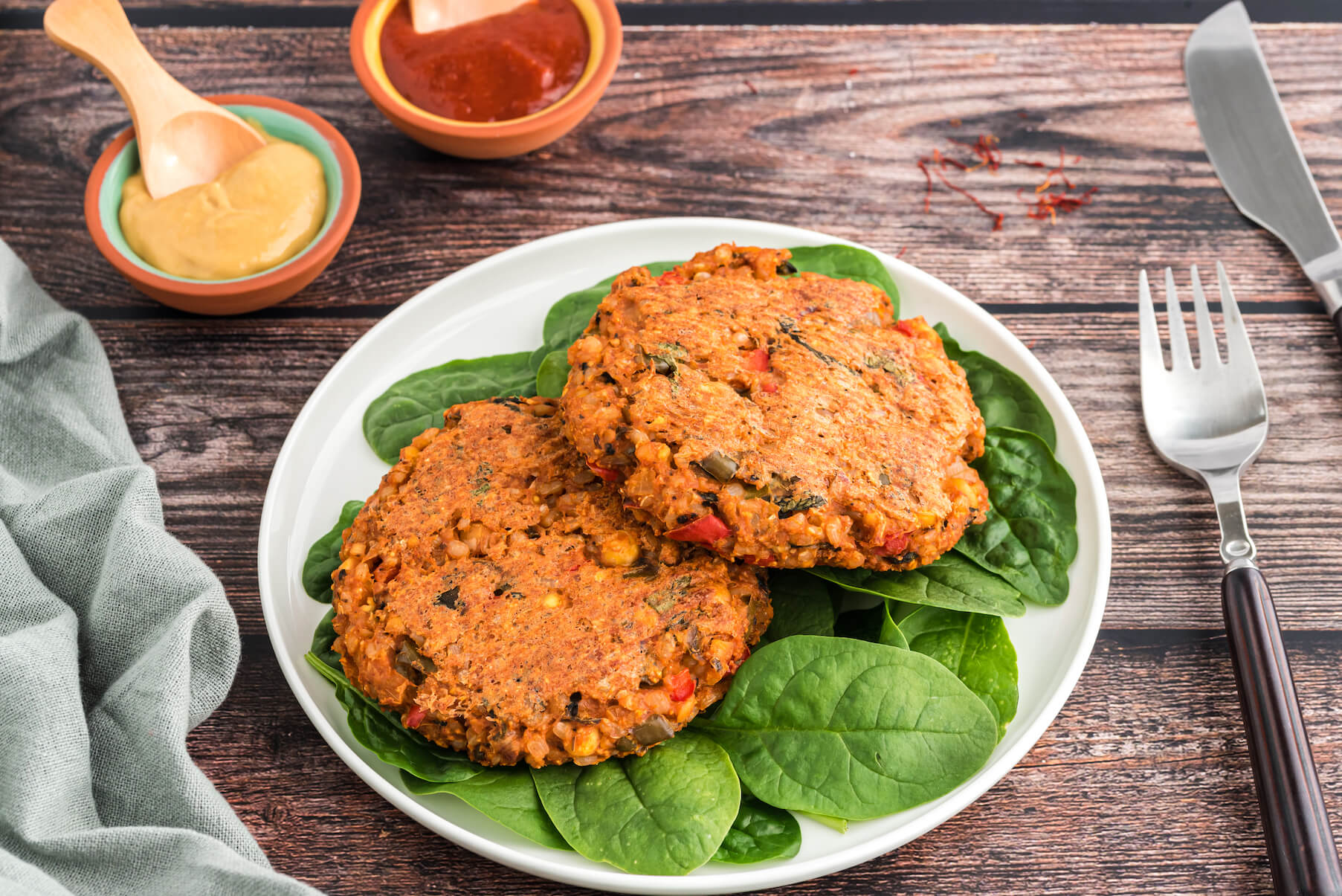
Bring the flavors of Spain to your table with these Spanish Paella Burgers With Chickpeas and Spinach!
Inspired by the traditional Valencian dish, these veggie burgers capture the essence of Mediterranean cuisine with short-grain brown rice, chickpeas, and spinach. Infused with the warm, aromatic spices of saffron and paprika, these burgers offer a delicious, plant-based twist on classic paella.
Whether for a casual meal or a themed dinner, these Paella Burgers bring the vibrant spirit of Spanish cuisine to your plate.
5. Moroccan Lentils and Tomatoes
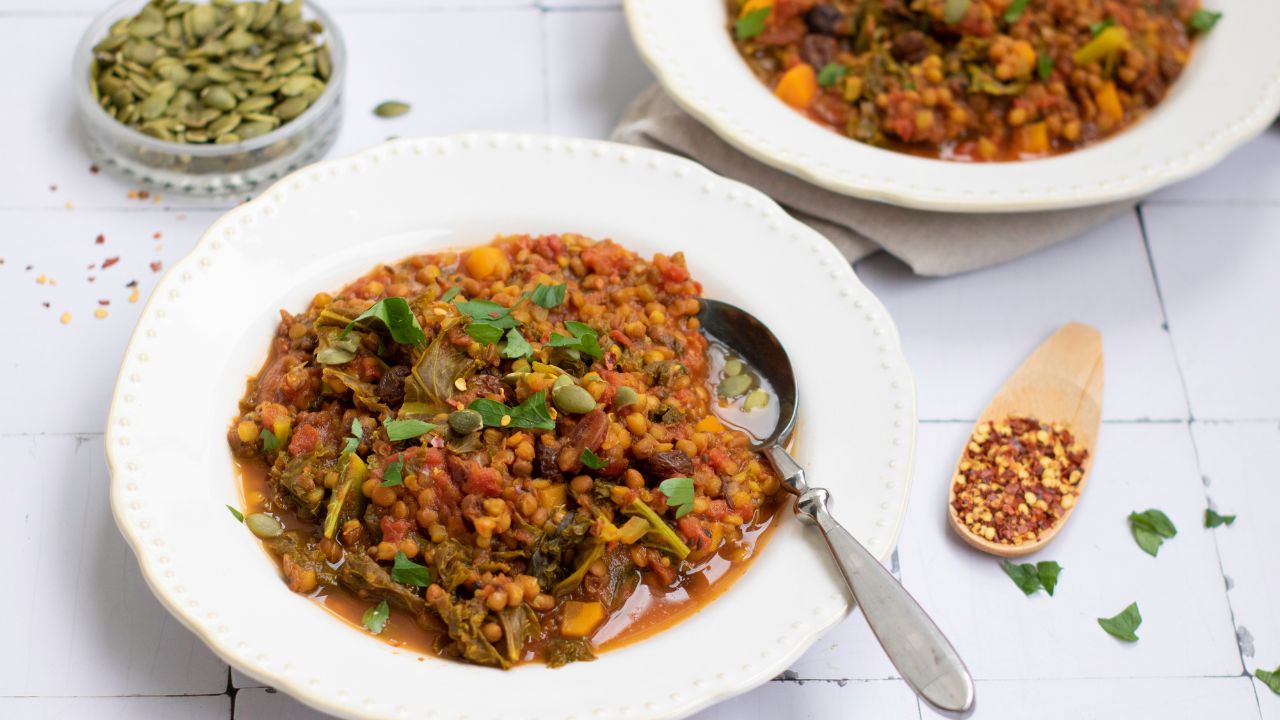
Explore the vibrant plant-based cuisine of North African Mediterranean cuisine with this Moroccan Lentils and Tomatoes dish.
This recipe combines warm spices like cumin, coriander, and mustard seeds with the sweetness of organic crushed tomatoes and raisins. Lentils and kale add a hearty, nourishing base, making this dish as versatile as it is flavorful.
Whether served as a main course or a side, this plant-based recipe showcases the diverse and delicious fusion of Mediterranean and North African flavors.
6. Broccolini Gremolata
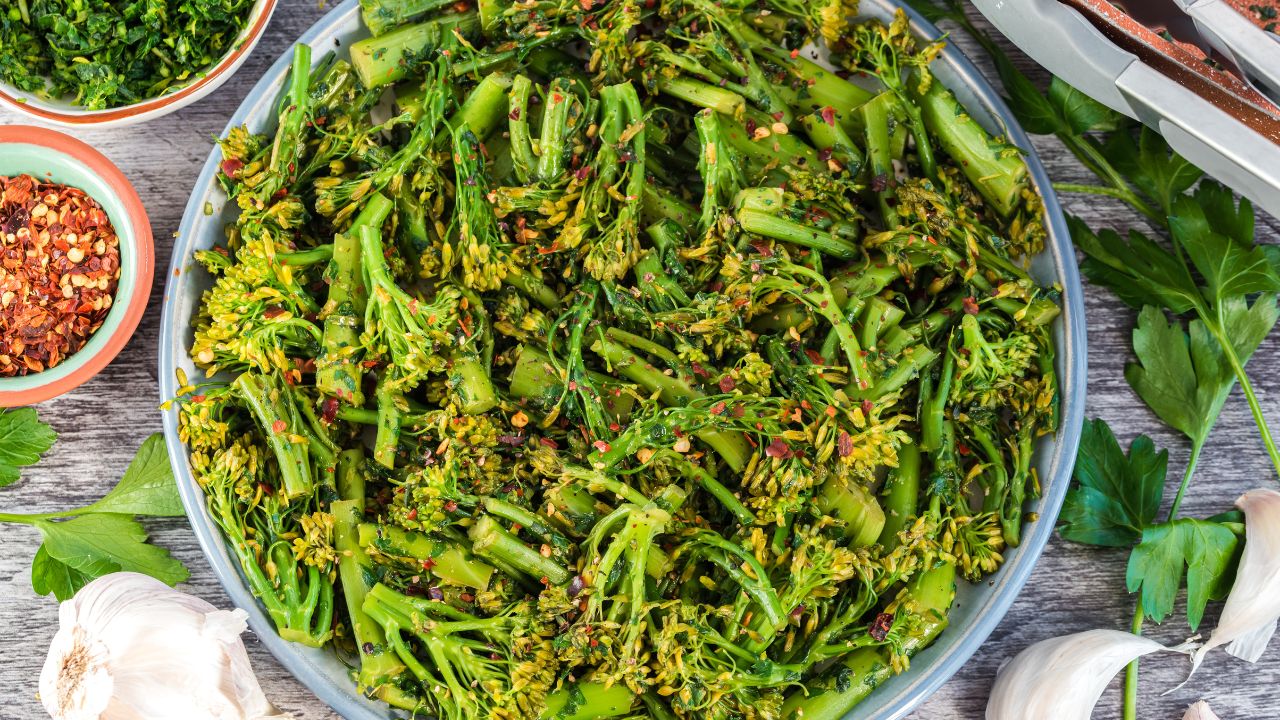
Gremolata is a traditional Italian condiment made from finely minced parsley, garlic, and lemon zest. It is known for adding a bright, fresh burst of flavor to any dish. This vibrant, nutrient-packed mix perfectly complements Mediterranean cuisine, making it an ideal topping for organic grilled tempeh or tofu, roasted vegetables, or crusty whole-grain bread.
Our Broccolini Gremolata brings this classic Italian garnish together with tender organic broccolini, elevated by extra virgin olive oil, salt, black pepper, and a hint of crushed red pepper flakes. This simple yet flavorful dish captures the essence of Mediterranean cooking, adding a fresh, herby twist to your meals.
7. Chocolate Pistachio Semifreddo
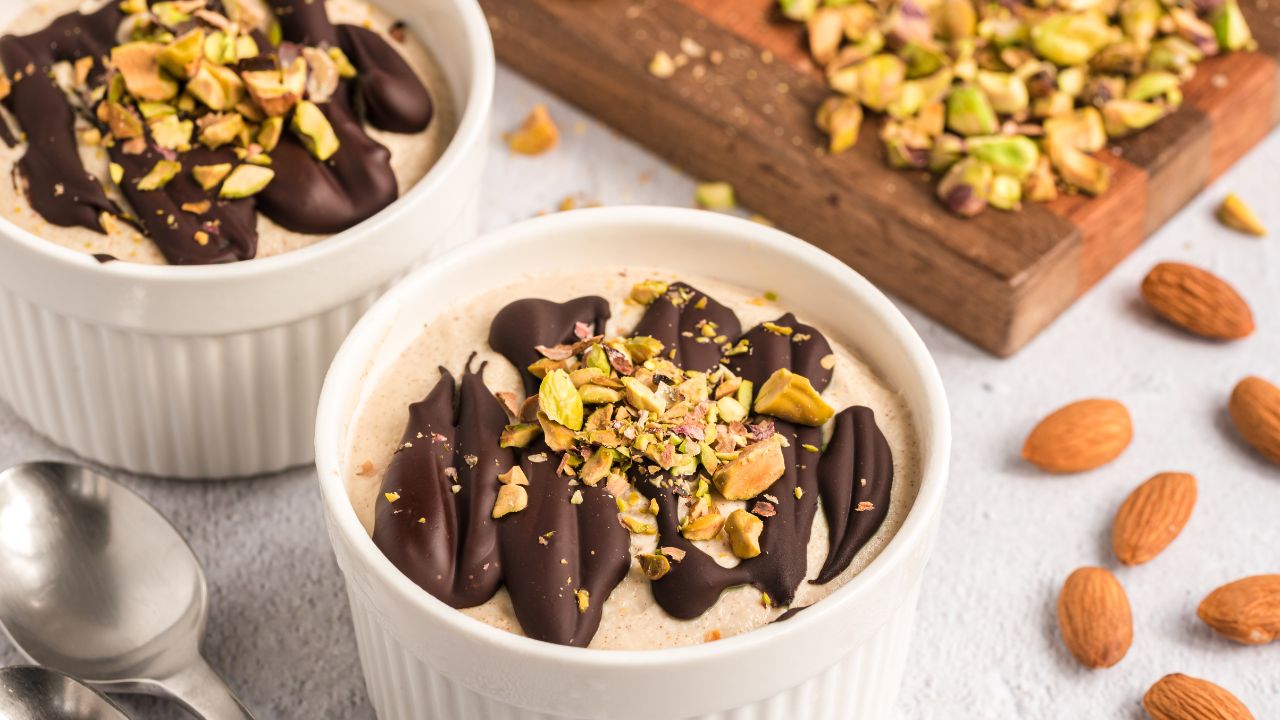
Chocolate Pistachio Semifreddo is a decadent dessert rooted in the rich culinary traditions of the Mediterranean.
Hailing from Italy, semifreddo, meaning “half-frozen,” offers a velvety, mousse-like texture that melts on your tongue. This plant-based version marries the nutty flavors of almonds and pistachios with the natural sweetness of dates and the fragrant warmth of vanilla. Including vegan dark chocolate chips adds a layer of healthful indulgence, perfectly complementing the Mediterranean-inspired ingredients.
Perfect for any occasion, this Italian semifreddo recipe is a delightful nod to the simple yet luxurious desserts of the Mediterranean.
Enjoy Mediterranean-Inspired Eating
Rooted in the traditional cultures of countries bordering the Mediterranean Sea, the Mediterranean diet emphasizes whole, plant-based foods that are rich in nutrients and flavor. From vibrant vegetables and hearty legumes to aromatic herbs and whole grains, these Mediterranean recipes provide a diverse and satisfying array of meal options that support a healthy lifestyle.
Remember that this diet is more than just a way of eating — it’s a lifestyle that encourages communal meals, mindful eating, and a balanced approach to nutrition.
Tell us in the comments:
- What plant-based dishes do you currently make that are inspired by the Mediterranean diet?
Featured Image: iStock.com/simonapilolla

